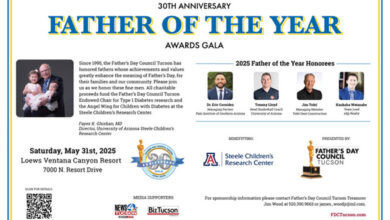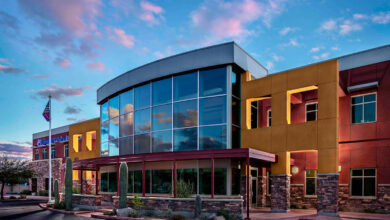
Founders’ ‘Wildest Dream’
By Christy Krueger –
Leap of Faith Leads to Business Success
When the home health company that Agnes Poore and Lynette Jaramillo worked for in the 1990s was sold, it gave them the opportunity to take a leap of faith and start their own business.
Jaramillo began by reading a book about achieving dreams, a book that motivated her to step beyond her doubts. “Casa is my wildest dream,” she said. “I followed the steps in that book. We got a small business loan. Now it’s gone beyond my wildest dream. It’s our legacy.”
Jaramillo needed a partner and Poore was the logical choice. They planned, set objectives and made financial arrangements. Since both expected a two-year start-up period before being in the black, it was important that their husbands go for the idea. And they did. While Jaramillo and Poore ran the business, the husbands served as volunteers. Poore joked that she and her partner know more about each other’s family finances than their husbands know about their own.
Right from the start, the entrepreneurs knew they wanted Casa de la Luz to be a for-profit hospice. While Medicare pays nonprofit and for-profit hospices the same and it mandates the same regulations, there were a variety of reasons to go the private route. Said Jaramillo, “I believe in free enterprise. I believe we can do a better job. We can make decisions on a per-patient basis. And I didn’t want to answer to a board – just me and my partner to make decisions.”
Poore and Jaramillo set a goal of caring for 100 to 125 patients at any given time. “When we reached 40, we celebrated,” Jaramillo said. “We had slow, steady growth for 20 years. We’ve taken care of over 20,000 patients in our community.
“All patients got the care they deserved. We have unique facilities not offered otherwise.”
To some extent, Medicare regulations had a hand in Casa’s growth. “Hospice started as a volunteer movement,” Jaramillo said. “Years later, Medicare started paying for it.”
Poore pointed out that after starting the business, Medicare began adding new rules, requirements and reporting. During their seventh year in business, in order to keep up, it became necessary to automate. This, in turn, gave them the ability to handle additional patients. And with Medicare’s increasing involvement with hospice, more people became familiar with the concept. “There are some benefits to regulation,” Poore said. “Hospice should grow.”
Dr. Suresh Katakkar, a semi-retired oncologist and Casa’s first referring physician, shares the hospice philosophy and hopes awareness of its mission continues to spread.
“Casa is complete care – spiritual, they’re with you all the way. The nurses are absolutely proficient, not just in taking care of the patient, but in all aspects of the person. That’s how I took care of my patients – from diagnosis to death or recovery. That’s what hospice does. Casa hires people who come to talk to you; it’s very important. Many patients are afraid, so you need psycho-social support. I can see that what I was practicing, Casa de la Luz is practicing.”
He also has personal experience with Casa. Katakkar’s wife was a patient 10 years ago and he became a patient in 2017 when he almost died of a spontaneous subdural hematoma. “I was in hospice three weeks and they gave me excellent service.”
As more of the population understands the hospice process and the baby-boom generation ages, Casa’s staff expects a tidal wave of change. “In the next five to seven years, there will be huge growth and those people want to be in control of their world at end of life,” Jaramillo said.





